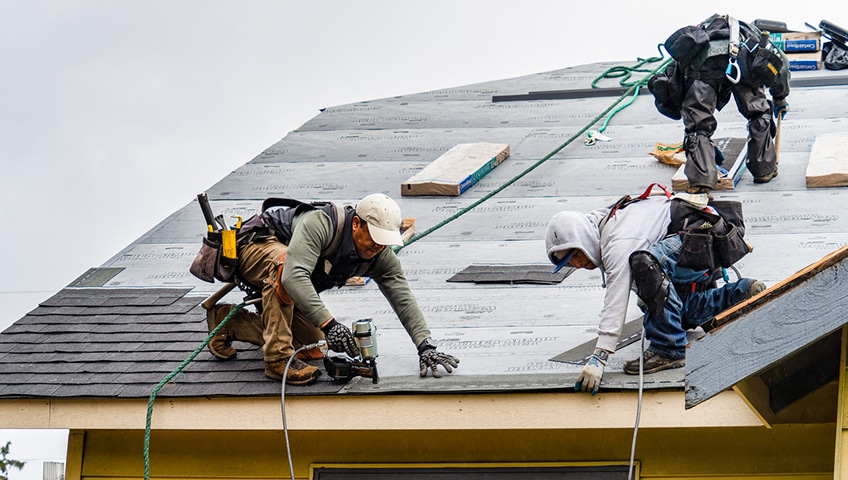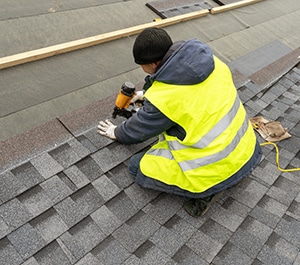
Roofers vs. Roofing Companies vs. General Contractors: Know the Difference
March 5, 2023
You are faced with a conundrum. You have a roofing problem that requires the service of a professional but need help figuring out where to turn. You have questions in your mind like, do I call a roofing company near me? Another question that arises is, are roofing companies in Toronto the right choice for my unique solution? Another question that may come to mind is whether specialized roofing companies deal specifically with the problems I’m experiencing. What about local roofing companies? Do they have the background and expertise for my job? For Toronto roofing problems, these questions and many more come up, and you’re not alone when trying to determine who to call in our world of specialized, credentialed experts. The problem begins with what type of company to call, a roofing contractor, a general contractor or a roofer – it is important to know the differences between the services offered to get the right people in the right place at the right time, especially if this is your first kick at the roofing can. In this guide, we will help you identify the appropriate party for your particular problem, and then you can decide how to proceed after you read our instructional article.
What is a Roofer?
Let’s look at some of the characteristics that roofers might exhibit to start our guide to give you a semblance of the landscape in the roofing industry.
- Generally, a roofer needs a ladder and some tools to complete basic tasks, so if you call a roofer, pay attention to the presentation.
- The company or person you call doesn’t have anything in the way of credentials – think professional certification or training in roofing – they might be a jack of all trades but a master of none or hold themselves out as a general contractor.
- They have no relationship with major roofing material brands and obtain their supplies from home improvement stores paying retail prices.
- They hold no professional accreditation and have no insurance or municipal licensing.
What is a Roofing Contractor?
A professional roofing contractor will have a different profile, and it shouldn’t be subtle because you should be able to spot the differences right away between a roofer and a roofing contractor.
- A contractor will have a high degree of experience and is constantly on the professional learning curve keeping their skill up to date.
- They possess tools and equipment; the big tell here is that they have safety equipment for their on-site work.
- They have relationships with major roofing material brands that afford them the opportunity to offer better pricing for materials lowering a homeowners’ overall estimate.
- They hold the correct licensing for the tasks they perform and are insured for liabilities – don’t be shy to ask to see insurance validation – when shopping for roofing services.
What is a General Contractor?
A general contractor is just what the title says; the company is responsible for all facets of construction in the residential, commercial and industrial sectors in the services they offer.
- A general contractor in the residential sector is focused on single or multiple-family dwellings, whether it is new construction or renovations.
- The general contractor’s primary responsibility is in project management through the use of subcontractors who have expertise in the work the general contractor hires for them.
- The general contractor is registered and licensed to perform the tasks related to all facets of the work being performed by the crews they hire.
- General contractors are generalists; while they know a little about many facets of home construction and renovations, they aren’t roofing specialists with the specific knowledge needed to perform the technically crucial work required to complete roofing work.
How a Roofing Company Works
Roofing companies may have various services to offer a homeowner, but their primary function or specialization is in the roofing field.
- They have a specialized team of roofing specialists. Still, the downside is they need to cover a large territory to make a profit, creating logistical problems that, in turn, affect work completion.
- A roofing company can offer better deals, have a great deal of equipment to meet the needs of any situation, and their teams are highly skilled and proficient in all tasks required for roofing work.
- For homeowners on a tight budget, a roofing company may be the answer due to the economy they offer in the area of materials and the need to keep their crews working, so they will take less on the estimate to get the work.
How a Roofing Contractor Works
A roofing contractor will hold licensing to perform roofing tasks contracted for, insurance and equipment – safety equipment, and they pay WSIB premiums for their staff.
- Contractors will provide warranties for labour – up to 10 years – and offer material warranties from the manufacturers for the supplies they install at the home. Shingle warranties can be as short as five or 25 years, depending on the materials’ quality.
- References and professional reputation are part of the roofing contractor package. You can find information on public websites to see the calibre of the contractor you are evaluating, don’t be afraid to ask for references during the estimate phase of the project.
- Finding a local contractor is the best course of action when seeking a contractor for your unique roofing situation. Local contractors do local work and have local references that can be validated and reviewed in person should a homeowner seek a visual review.
- One downside of a local contractor is that they are generally a smaller company, can be a little more expensive, and the project can take a little longer. But the quality in workmanship and expertise is the great equalizer when using a roofing contractor for your work; you only get what you pay for and a couple more dollars to ensure quality is money well spent.
The Difference Between a Contractor and a Company
Let’s review the differences between a roofing company and a contractor to establish some clarity between the two entities.
- A contractor is a single entity, while a company is a group of people with different responsibilities.
- Contractors use subcontractors to complete projects, while roofing companies are end-to-end project managers from estimate through to project completion.
- A roofing company has a team of professionals to complete projects, but a contractor may not have a crew or the level of specialized skills a roofing company has.
Who is the Better Option?
The job demands will dictate whether you choose a contractor or a roofing company when assessing your needs as a homeowner. The fit is determined by need and depends on what you need. A roofing company might deliver the best results if the work is a repair or roof replacement with standard materials – like asphalt/composite/metal shingles. If you have structural problems – like replacing trusses or rafters or installing slate shingles – you may want a roofing contractor to handle the work because specialized professionals will perform the work. You need to review both groups’ bodies of work to find the best solution for your roofing problems.
Ask the Right Questions to Make the Right Decision
Knowledge is power, and to empower yourself, you need to ask the right questions to get the best results for your roofing solution. Here is a list of questions to help you make informed decisions.
- How long have they been in business – look for companies with at least a decade’s worth of service in the roofing business – also, find out if they have a brick and mortar location (it demonstrates stability in the business)
- Ask for references and follow up with the references for validation purposes.
- Determine if they use subcontractors or perform the work themselves. The answer you are looking for is that they DON’T use subcontractors.
- Ask to see their insurance accreditation and licensing – hard copies – for the work you need to be done.
- Ask about their workmanship warranty – standard workmanship warranties run between five and ten years – also, ask about product warranties for the material that will be installed at your home.
Consult Integrity Roofers, Your Professional Roofing Company in Toronto




















